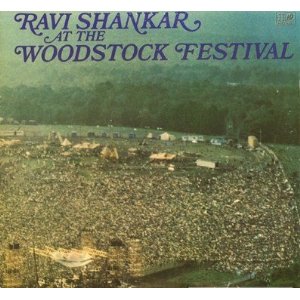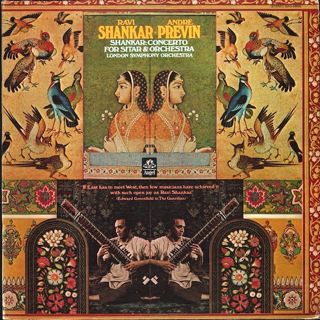
Ravi Shankar, was an Indian sitarist and composer. A sitar virtuoso, he became the world's best-known export of North Indian classical music in the second half of the 20th century, and influenced many musicians in India and throughout the world. Shankar was awarded India's highest civilian honour, the Bharat Ratna, in 1999.

Raga is a 1971 documentary film about the life and music of Indian sitarist Ravi Shankar, produced and directed by Howard Worth. It includes scenes featuring Western musicians Yehudi Menuhin and George Harrison, as well as footage of Shankar returning to Maihar in central India, where as a young man he trained under the mentorship of Allauddin Khan. The film also features a portion of Shankar and tabla player Alla Rakha's acclaimed performance at the 1967 Monterey Pop Festival.
John Barham is an English classical pianist, composer, arranger, producer and educator. He is best known for his orchestration of George Harrison albums such as All Things Must Pass (1970) and for his association with Indian sitar maestro Ravi Shankar.
Ravi Shankar had numerous solo recordings published, including these:

At the Woodstock Festival is a live album by Indian classical musician Ravi Shankar that was released in 1970 on World Pacific Records. It was recorded on 15 August 1969, during the first day of the Woodstock Festival in upstate New York. Shankar's set took place during a downpour and he later expressed his dissatisfaction with the event due to the prevalence of drugs among the crowd.

Full Circle: Carnegie Hall 2000 is a live album by Indian musician and composer Ravi Shankar, released in 2001 through the record label Angel Records. Recorded at Carnegie Hall in October 2000 as part of a tour with Shankar's daughter Anoushka, the album contains five tracks and presents two ragas. The concert occurred sixty-two years after Shankar's first performance at Carnegie Hall and commemorated his eightieth birthday; the album was his first live recording in nearly twenty years. Full Circle was produced by Hans Wendl, mastered by Scott Hull, and mixed and engineered by Tom Lazarus. Featured are performances by Tanmoy Bose and Bickram Ghosh on tabla, and Anoushka and Ravi on sitar.

Ravi Shankar's Music Festival from India was an Indian classical music revue led by sitarist and composer Ravi Shankar intended for Western concert audiences and performed in 1974. Its presentation was the first project undertaken by the Material World Charitable Foundation, set up the previous year by ex-Beatle George Harrison. Long a champion of Indian music, Harrison also produced an eponymous studio album by the Music Festival orchestra, which was released in 1976 on his Dark Horse record label. Both the CD format of the Ravi Shankar's Music Festival from India album and a DVD of their performance at the Royal Albert Hall in London were issued for the first time on the 2010 Shankar–Harrison box set Collaborations.

In Concert 1972 is a double live album by sitar virtuoso Ravi Shankar and sarodiya Ali Akbar Khan, released in 1973 on Apple Records. It was recorded at the Philharmonic Hall, New York City, in October 1972, and is a noted example of the two Hindustani classical musicians' celebrated jugalbandi (duet) style of playing. With accompaniment from tabla player Alla Rakha, the performance reflects the two artists' sorrow at the recent death of their revered guru, and Khan's father, Allauddin Khan. The latter was responsible for many innovations in Indian music during the twentieth century, including the call-and-response dialogue that musicians such as Shankar, Khan and Rakha popularised among Western audiences in the 1960s.

Chants of India is an album by Indian musician Ravi Shankar released in 1997 on Angel Records. Produced by his friend and sometime collaborator George Harrison, the album consists of Vedic and other Hindu sacred prayers set to music, marking a departure from Shankar's more familiar work in the field of Hindustani classical music. The lyrical themes of the recorded chants are peace and harmony among nature and all creatures. Sessions for the album took place in the Indian city of Madras and at Harrison's home in Henley-on-Thames, Oxfordshire, following his work on The Beatles' Anthology (1995). Anoushka Shankar, John Barham, Bikram Ghosh, Tarun Bhatacharaya and Ronu Majumdar are among the many musicians who contributed to the recording.
Kamalesh Maitra, often referred to by the title Pandit, was an Indian classical musician, composer and teacher. He is recognised as the last master of the tabla tarang – a melodic percussion instrument consisting of numerous individually tuned hand drums, set in a semicircle. Maitra grew up in Calcutta and played the tabla until joining Uday Shankar's ballet company in 1950 and taking up the tabla tarang. He became the company's musical director and toured internationally with the troupe through to the mid 1970s.

West Meets East is an album by American violinist Yehudi Menuhin and Indian sitar virtuoso Ravi Shankar, released in Britain in January 1967. It was recorded following their successful duet in June 1966 at the Bath Musical Festival, where they had played some of the same material.

Music of India: Morning and Evening Ragas is the debut album by Indian sarod master Ali Akbar Khan, released in 1955. Issued on Angel Records, it is considered a landmark recording, being the first album of Indian classical music ever released.

West Meets East, Volume 2 is an album by American violinist Yehudi Menuhin and Indian sitar virtuoso Ravi Shankar, released in 1968. It is the second album in a trilogy of collaborations between the two artists, after the Grammy Award-winning West Meets East (1967).
Kamala Chakravarty is an Indian classical musician and former dancer, known for her association with sitar maestro Ravi Shankar. From 1967 until the late 1970s, she accompanied Shankar, in the role of tambura player and singer, in a number of acclaimed performances, including the Monterey International Pop Festival (1967), his Human Rights Day duet with violinist Yehudi Menuhin (1967), the Concert for Bangladesh (1971) and the Music Festival from India (1974). She lived with Shankar as his "wife" from 1967 to 1981, while he was still married to musician and teacher Annapurna Devi.
The Asian Music Circle was an organisation founded in London, England, in 1946, that promoted Indian and other Asian styles of music, dance and culture in the West. The AMC is credited with having facilitated the assimilation of the Indian subcontinent's artistic traditions into mainstream British culture. Founded by Indian writer and former political activist Ayana Angadi and his English wife, Patricia Fell-Clarke, a painter and later a novelist, the organisation was run from their family home in the north London suburb of Finchley.

Ravi Shankar: In Celebration is a compilation box set by Indian classical musician and composer Ravi Shankar, released in 1996 on Angel Records in conjunction with Dark Horse Records. The four discs cover Shankar's international career, from the 1950s to the mid 1990s, and include recordings originally released on the World Pacific, HMV, Angel, Apple, Dark Horse and Private Music record labels. Shankar's friend George Harrison compiled and co-produced the set, which was issued as part of year-long celebrations for Shankar's 75th birthday.

Live: Ravi Shankar at the Monterey International Pop Festival is a live album by Indian sitarist Ravi Shankar, released on the World Pacific record label in November 1967. It consists of part of Shankar's celebrated performance at the Monterey International Pop Festival in California on 18 June 1967. Shankar was accompanied throughout by his regular tabla player, Alla Rakha, who performs a frenetic five-minute solo on the recording.

Ravi Shankar's Festival from India is a double album by Indian musician and composer Ravi Shankar, released on World Pacific Records in December 1968. It contains studio recordings made by a large ensemble of performers, many of whom Shankar had brought to the United States from India. Among the musicians were Shivkumar Sharma, Jitendra Abhisheki, Palghat Raghu, Lakshmi Shankar, Aashish Khan and Alla Rakha. The project presented Indian classical music in an orchestral setting, so recalling Shankar's work as musical director of All India Radio in the years before he achieved international fame as a soloist during the 1960s.

Concerto for Sitar & Orchestra is a studio album by Indian musician and composer Ravi Shankar with the London Symphony Orchestra (LSO) conducted by André Previn. The concerto was premiered at London's Royal Festival Hall on 28 January 1971, and subsequently released in Britain and America.

Ananda Shankar is the debut album by Indian musician Ananda Shankar, the son of dancer and choreographer Uday Shankar and the nephew of Indian classical musician Ravi Shankar. It was released in 1970 on the Reprise record label. The album fuses Indian music with Western rock and electronic music, and was among the first works in the rock genre by an Indian musician. Consisting mainly of instrumental recordings featuring sitar and Moog synthesizer, it includes a cover version of the Rolling Stones' 1968 hit song "Jumpin' Jack Flash" and a thirteen-minute Indian-style piece titled "Sagar ".















